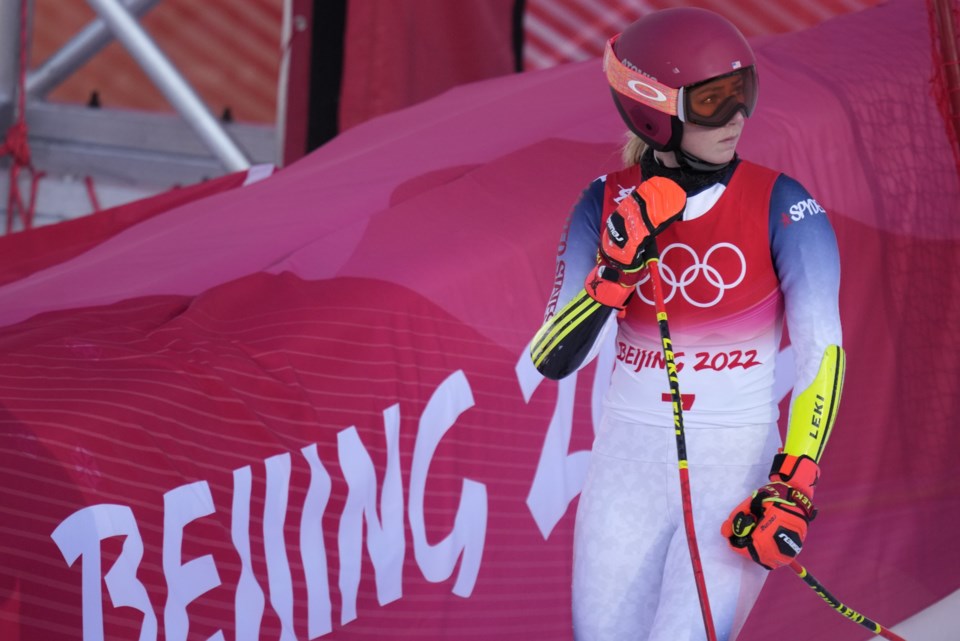BEIJING (AP) ŌĆö Maybe this ŌĆ£huge disappointmentŌĆØ ŌĆö her words upon missing a gate early in the first Alpine race at the Beijing Olympics ŌĆö will serve Mikaela Shiffrin well moving forward.
Maybe, just maybe, after describing her approach to the turn that ended her 2022 Games debut as ŌĆ£almost anxious,ŌĆØ this unusual mistake will help Shiffrin take stock of things and head into her next event, WednesdayŌĆÖs slalom, and the ones after that, with a fresh mind, renewed enthusiasm and a strong sense of what went wrong.
ŌĆ£ThereŌĆÖs a lot of questions that will be asked,ŌĆØ the two-time Olympic gold medalist from the United States said Monday, when after about 10 seconds. ŌĆ£And I think many people are going to say, ŌĆśWhat went wrong this entire time?ŌĆÖŌĆØ
So before she heads back out on a course known as The Ice River, one that none of the worldŌĆÖs elite racers had ever been on until this trip to China, it could be instructive to look back to what happened the last time Shiffrin failed to finish a giant slalom.
That was ŌĆö get this ŌĆö four years, and 30 races, ago, all the way back on Jan. 23, 2018, in the Kronplatz World Cup stop at San Vigilio di Marebbe, Italy. And that, it turns out, came just two days after she missed a gate in a super-G in Cortina, Italy.
on the day of that GS error, Shiffrin reflected in a strikingly similar way about what ŌĆ£peopleŌĆØ might be thinking. Back then, this is what she said: ŌĆ£I can see it in my mind: ŌĆśMikaela Shiffrin faltering before the Olympics.ŌĆÖŌĆØ
Later in that conversation at the team hotel with AP reporter Andrew Dampf, Shiffrin settled on the way she wanted to process what was going on as those Winter Games approached, drawing this conclusion: ŌĆ£Today is just a lesson to remember that nobody is invincible.ŌĆØ
And how did everything turn out then?
Shiffrin wound up leaving Pyeongchang with two medals: the gold from the giant slalom and the silver from the combined, to go alongside her slalom gold from the 2014 Sochi Games.
One more gold would give her an American-record three in Alpine skiing.
She could have as many as four more individual races left in Beijing. So looking ahead was where she wanted to put her focus Monday after a hug from her mom, Eileen, who also helps with coaching, and a chat with her boyfriend, Aleksander Aamodt Kilde, a Norwegian who was fifth in the downhill.
Shiffrin got back on her skis and got back on the mountain to practice slalom.
Part of what was so surprising about the way the GS ended is that Shiffrin is because of how perfect her form is and how infrequently she falters.
ŌĆ£A textbook of skiing technique,ŌĆØ is the way double Olympic gold medalist Ted Ligety puts it.
ŌĆ£ItŌĆÖs her approach, her understanding, of how to get from Point A to Point B quickly enough to win without taking any undue risk,ŌĆØ explains six-time Olympic medalist Bode Miller.
Shiffrin pointed out just how much work she does put in to avoid the kind of flub that derailed her Monday, when she came through a bumpy turn, couldnŌĆÖt quite recalibrate properly and ended up sliding on her left hip and hand until it was too late to recover.
The 26-year-old from Colorado also brought up some of the setbacks she dealt with during the run-up to Beijing.
There was from late October to early November. The bout with COVID-19 in late December that forced her off the slopes for more than a week.
ŌĆ£We can go to a lot of different places during the season where we can put the blame,ŌĆØ she said. ŌĆ£But I think the easiest thing to say is that I skied a couple of good turns and I skied one turn a bit wrong and I really paid the hardest consequence for that.ŌĆØ
ŌĆ£And now,ŌĆØ she added, ŌĆ£we have to move forward, because thereŌĆÖs a lot still to come the next weeks.ŌĆØ
Sure is.
And there are plenty of people ŌĆö most notably, her competitors ŌĆö who would expect nothing less than a top-of-her-abilities Shiffrin the next time out.
ŌĆ£I think she will rise up again,ŌĆØ said Ragnhild Mowinckel, a Norwegian who took the silver behind Shiffrin in the Olympic giant slalom four years ago, ŌĆ£and she will probably nail the slalom.ŌĆØ
___
AP Sports Writer Andrew Dampf contributed to this report.
___
More AP Olympics: https://apnews.com/hub/winter-olympics and https://twitter.com/AP_Sports
Howard Fendrich, The Associated Press


